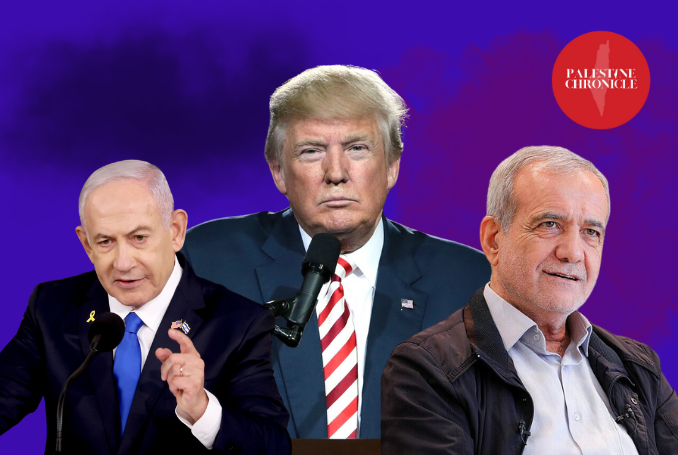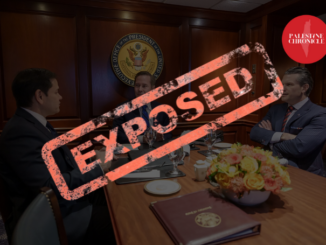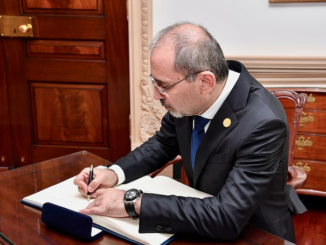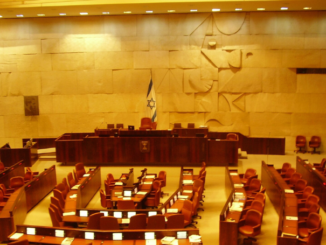
By Ramzy Baroud 
Trump’s unexpected embrace of diplomacy with Iran has thrown Netanyahu off balance and exposed cracks in the US-Israel “special relationship.”
As usual, US President Donald Trump has given all sides enough talking points to sway the argument in their favor.
In his White House meeting with Israeli Prime Minister Benjamin Netanyahu on Monday, he repeated his idea about “tak(ing) the people, the Palestinians, and mov(ing) them around to different countries,” but also insisted that he would “like to see the war stop.”
This was not the only contradictory statement in Netanyahu’s visit, or rather summoning by Trump to the Oval Office. The contradictions have virtually reached every topic touched on by the US President.
Therefore, some Middle Eastern Arab commentators have rightly pointed to the fact that Trump has doubled down on his support of the Israeli genocide in Gaza.
For their part, Israeli commentators spoke about the ‘embarrassment,’ deep ‘disappointment,’ and even ‘shock’ felt by Netanyahu and his team when they discovered that Trump was holding ‘direct talks’ — indirect from the Iranian viewpoint — with Tehran in Oman, starting on Saturday.
We, at the Palestine Chronicle, are also tempted to move forward beyond the previously unscheduled visit and the bizarre press conference, as if another episode filled with Trump’s shenanigans and confused foreign policy.
However, a few points here deserve a pause:
One, Netanyahu was asked to come to the US during his visit to the Hungarian capital, Budapest. This is not customary, as Netanyahu is usually given ample time to prepare for such visits and to use them for his propaganda campaign to show his significance to the American agenda in the Middle East and beyond.
Two, the fact that Netanyahu was not allowed to postpone the meeting points to the element of urgency and seriousness on the part of the Americans, and their perception of Netanyahu as a leader of an inferior state, not an equal partner.
Three, Trump’s declaration that ‘direct’ talks with Iran have already been scheduled and, according to Israeli media, Netanyahu either was taken by surprise during the conference or only knew a few minutes prior. This is almost unprecedented in US-Israeli relations, especially in recent years.
Four, it’s a stunning development that Trump — the same person who unilaterally tore up the Iran nuclear deal in 2018 — is now leading the push for dialogue with Iran. Netanyahu must be furious and certainly confused, knowing that his greatest foreign policy achievement so far has been the destruction of the West-Iran nuclear agreement.
Five, though not declared, Netanyahu must also realize that dialogue and a potential agreement with Iran would mean the cooling down of all fronts involving Iran, including conflicts with Iran’s main allies in the region — Ansarallah in Yemen, Hezbollah in Lebanon, Iraqi militias in Iraq — but more importantly, Palestinian Resistance.
Six, Netanyahu, unlike his previous visit or all other past visits, returned to Israel without claiming a single victory, not even a symbolic one, that would allow him to take a victory lap, thumbing his nose at his detractors and reassuring his government coalition that he is the uncontested leader of Israel.
All of these points, of course, are subject to the whims of Trump and his contradictory nature. If Netanyahu fails to sway the US administration back to the path of confrontation, and if Trump insists on moving forward with the new discourse, Netanyahu could find himself dealing with a political reality unfamiliar to him, the consequences of which would be dire for his genocide-driven agenda.
(The Palestine Chronicle)

– Ramzy Baroud is a journalist and the Editor of The Palestine Chronicle. He is the author of six books. His latest book, co-edited with Ilan Pappé, is “Our Vision for Liberation: Engaged Palestinian Leaders and Intellectuals Speak out”. Dr. Baroud is a Non-resident Senior Research Fellow at the Center for Islam and Global Affairs (CIGA). His website is www.ramzybaroud.net








Wait a few days, he’ll probably change his mind. He likes to keep people guessing what he’ll do next.
The word given by these two genocidaires is worth nothing, absolutely nothing.
This is probably a ruse: pretend-negotiate, while gathering intelligence about where Iran’s top leaders are. This has been a common tactic, for example prior to Sayyed Hassan Nasrallah being assassinated. Meanwhile, the US military build-up in the region continues. Iran has consistently said they will not engage in direction negotiations. Here’s a snippet of what Iran’s FM Araqchi said: “Pursuing indirect negotiations is not a tactic or reflection of ideology but a strategic choice rooted in experience. We face a significant wall of mistrust and harbor serious doubts about the sincerity of intentions, made worse by U.S. insistence on resuming the “maximum pressure” policy…”